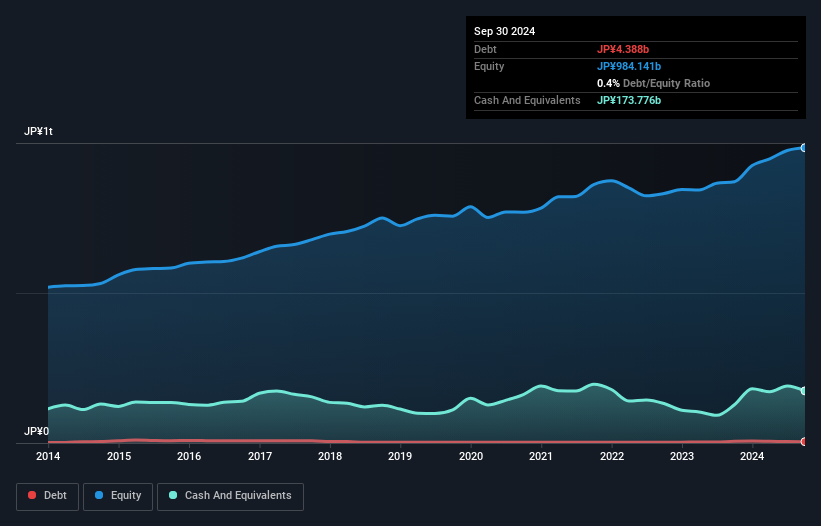Howard Marks put it nicely when he said that, rather than worrying about share price volatility, ‘The possibility of permanent loss is the risk I worry about… and every practical investor I know worries about.’ So it might be obvious that you need to consider debt, when you think about how risky any given stock is, because too much debt can sink a company. We note that Nippon Television Holdings, Inc. (TSE:9404) does have debt on its balance sheet. But the real question is whether this debt is making the company risky.
Why Does Debt Bring Risk?
Generally speaking, debt only becomes a real problem when a company can’t easily pay it off, either by raising capital or with its own cash flow. Ultimately, if the company can’t fulfill its legal obligations to repay debt, shareholders could walk away with nothing. While that is not too common, we often do see indebted companies permanently diluting shareholders because lenders force them to raise capital at a distressed price. Of course, the upside of debt is that it often represents cheap capital, especially when it replaces dilution in a company with the ability to reinvest at high rates of return. When we think about a company’s use of debt, we first look at cash and debt together.
See our latest analysis for Nippon Television Holdings
What Is Nippon Television Holdings’s Debt?
The image below, which you can click on for greater detail, shows that Nippon Television Holdings had debt of JP¥4.39b at the end of September 2024, a reduction from JP¥5.93b over a year. But on the other hand it also has JP¥173.8b in cash, leading to a JP¥169.4b net cash position.

How Healthy Is Nippon Television Holdings’ Balance Sheet?
According to the last reported balance sheet, Nippon Television Holdings had liabilities of JP¥103.6b due within 12 months, and liabilities of JP¥129.3b due beyond 12 months. Offsetting these obligations, it had cash of JP¥173.8b as well as receivables valued at JP¥99.4b due within 12 months. So it actually has JP¥40.3b more liquid assets than total liabilities.
This short term liquidity is a sign that Nippon Television Holdings could probably pay off its debt with ease, as its balance sheet is far from stretched. Succinctly put, Nippon Television Holdings boasts net cash, so it’s fair to say it does not have a heavy debt load!
The good news is that Nippon Television Holdings has increased its EBIT by 5.0% over twelve months, which should ease any concerns about debt repayment. When analysing debt levels, the balance sheet is the obvious place to start. But ultimately the future profitability of the business will decide if Nippon Television Holdings can strengthen its balance sheet over time. So if you’re focused on the future you can check out this free report showing analyst profit forecasts.
But our final consideration is also important, because a company cannot pay debt with paper profits; it needs cold hard cash. Nippon Television Holdings may have net cash on the balance sheet, but it is still interesting to look at how well the business converts its earnings before interest and tax (EBIT) to free cash flow, because that will influence both its need for, and its capacity to manage debt. During the last three years, Nippon Television Holdings produced sturdy free cash flow equating to 75% of its EBIT, about what we’d expect. This cold hard cash means it can reduce its debt when it wants to.
Summing Up
While it is always sensible to investigate a company’s debt, in this case Nippon Television Holdings has JP¥169.4b in net cash and a decent-looking balance sheet. The cherry on top was that in converted 75% of that EBIT to free cash flow, bringing in JP¥34b. So is Nippon Television Holdings’s debt a risk? It doesn’t seem so to us. Above most other metrics, we think its important to track how fast earnings per share is growing, if at all. If you’ve also come to that realization, you’re in luck, because today you can view this interactive graph of Nippon Television Holdings’s earnings per share history for free.
If, after all that, you’re more interested in a fast growing company with a rock-solid balance sheet, then check out our list of net cash growth stocks without delay.
Valuation is complex, but we’re here to simplify it.
Discover if Nippon Television Holdings might be undervalued or overvalued with our detailed analysis, featuring fair value estimates, potential risks, dividends, insider trades, and its financial condition.
Access Free Analysis
Have feedback on this article? Concerned about the content? Get in touch with us directly. Alternatively, email editorial-team (at) simplywallst.com.
This article by Simply Wall St is general in nature. We provide commentary based on historical data and analyst forecasts only using an unbiased methodology and our articles are not intended to be financial advice. It does not constitute a recommendation to buy or sell any stock, and does not take account of your objectives, or your financial situation. We aim to bring you long-term focused analysis driven by fundamental data. Note that our analysis may not factor in the latest price-sensitive company announcements or qualitative material. Simply Wall St has no position in any stocks mentioned.
